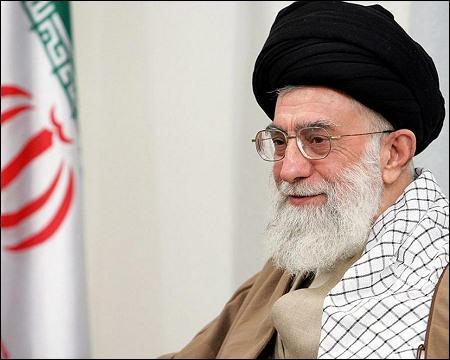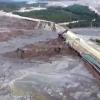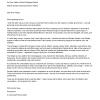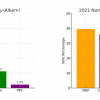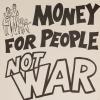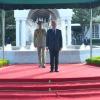Dear Ayattolah Khamenei
I would have preferred to send you this letter privately but I knew it would not get to you through conventional channels. So, I decided to instead write you an open letter to raise my concerns about several issues over which you can make a real difference.
As you are aware, the Kurdish struggle for self-determination in Iran begun decades ago. Indeed, tens of thousands of Kurds joined demonstrations that helped topple the Shah in the hope that by cooperating with their Iranian brothers and sisters they might receive simple recognition of their centuries old hope for self-determination. Sadly, this did not happen as the post-revolutionary government proved to be every bit as deaf as the Shah’s regime to legitimate aspirations of the Kurdish people.
True to history, the use of intimidation and repression to exterminate failed to extinguish the dream of an entire people.
Also true to history the use of such measures only inflamed passions and created the tragic perception that violence loomed as the only option. Yet years of violent conflict failed to extract concessions from any side and resulted in a zero-sum game in which the only winners were arms dealers and other nefarious forces eager to profit from the misery of others.
History testifies to the reality that violence cannot resolve this intractable political problem, an obvious point upon which you and I must surely agree.
Surely it is now time to recognise that the only way forward is to acknowledge that all Iran’s peoples are entitled to enjoy their basic rights, which includes a say in shaping their future. Camouflaging an authoritarian rejection of this principle behind a pseudo-religious façade cannot hide the reality and legitimacy of the Kurdish claim.
This point is even clear from a state-centric perspective whereby a disenfranchised and disempowered people will not only undermine Iran’s cohesion and prosperity, but also provide a permanent tool to be used by Tehran’s enemies. The beauty of Iran is in its multiculturalism and this diversity has created a unique and colourful society. This diversity needs to be nurtured and encouraged, not denied.
Dear Ayattolah Khamenei
You are well aware that the world is experiencing dramatic changes. Tragically, the consequences of these developments are especially evident in the Middle East.
For Iran to emerge from this chaos in a stronger and more cohesive state it will require a visionary leader willing to position the nation so that it better harness the new social and cultural forces unleashed by late modernity. Recognising that these historical forces can only add weight to the Kurdish claim must be part of this.
Indeed, two de-facto Kurdish states have already emerged in Iraqi and Syrian Kurdistan, and even Ankara now appears to accept it can no longer attempt to bludgeon Kurdish aspirations out of existence and that it must reach some form of peaceful consensus with its own Kurdish people. Iran cannot just be a spectator in these developments and if it is to emerge stronger from the current turmoil it must take the lead in steering all players towards a just resolution.
In a sense, Iran is fortunate in that the majority of its Kurdish population consider themselves Iranians. However, there is no guarantee that this will remain so. Becoming a proactive force towards a peaceful resolution of the Kurdish problem might help sustain this loyalty. But the longer the wider tumult continues and the longer Kurdish people suffer the less likely this positive scenario will become.
You speak often of the threat to Iranian stability and cohesion posed by external powers. You no doubt have a firm belief that they will not succeed. But like many others, I am less sanguine and am of the view that unless current social ailments are addressed in an inclusive way, the malevolent influence of outsiders will only grow.
In such an eventuality, Iran might descend into a level of chaos akin to that currently tearing apart its neighbours. Astute observers acknowledge that Iran is much more diverse than Iraq and Syria; it is a truly multi-national and multi-ethnic nation. Should a forced-change be imposed, centrifugal forces could see national and ethnic groups seek to go their own way. More likely, the Kurds would seek to join with their Kurdish brethren across the borders, and what authority could stop them? Similar irredentist forces could also sweep Azeris, Baluchis, Arabs and others away from Tehran and into the dream-like foment of a world made up of ethnically discrete microstates.
I counsel you to pre-empt the forces that could trigger such a scenario by moving to adopt a federal system in Iran. This would be a system in which Iran’s national and ethnic minorities enjoy their economic, social, cultural and political rights, while still remaining an integral part of the Iranian nation. There has long been a historical misconception that federalism will create division and lead to the disintegration of Iran but this is wrong. On the contrary, correctly planned and delicately implemented federalism looms as the only viable thread capable of holding the nation together in a new and more complex world.
Dear Ayattolah Khamenei
A visionary leader understands the past but looks to the future. They anticipate trends calmly and rationally and uncorrupted by a romanticised conception of the past. A great leader has the utmost welfare of his people and country in mind. I am hoping that you are such a visionary and good leader and will address the problem of minorities, resolve the current economic problems of Iran, lead your country out of its current calamity, and work towards a happy and prosperous future for all Iranians before it is too late.
If we put aside our ideological dogmatism, it is clear that we all share a common humanity based on mutual respect and dignity. In the current era no amount of force will be able to hold divergent peoples together, but I can assure you that respect and mutual understanding will.
Yours sincerely
Dr Hussein Tahiri











